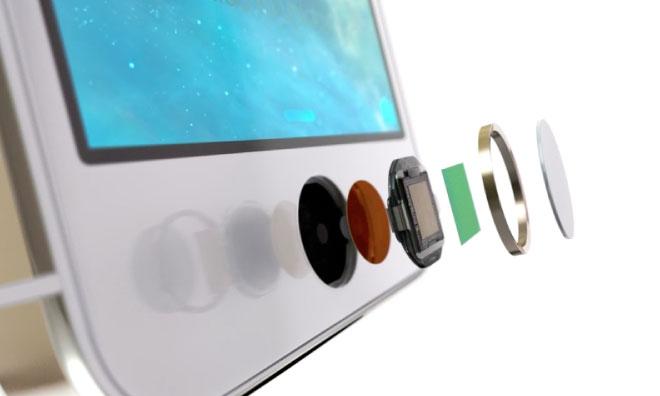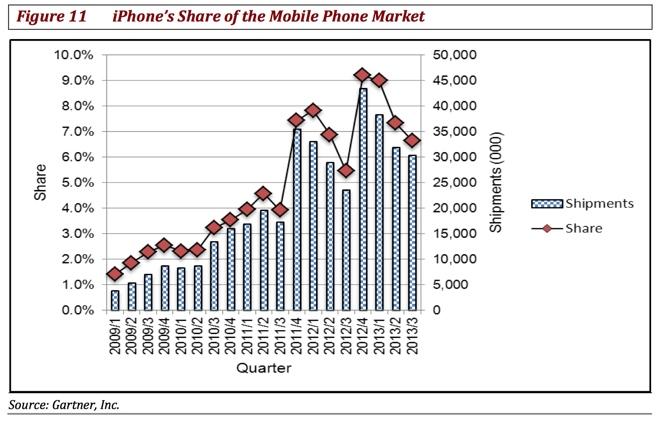iPhone dominance in user engagement, developer payouts trumps unimportant market share stats - analyst
Apple's share of the mobile phone market is growing, but it still remains below 10 percent, even as Apple and its development community rake in profits from an actively engaged user base. That led analyst Charlie Wolf on Thursday to raise the question: Does market share matter?
The conclusion reached by the Needham & Co. analyst in a note to investors: Market share matters "very little." More important variables in mobile success, Wolf said, are the breadth of the available applications library and the strength of its ecosystem.
Apple has steadily grown its share of the total mobile phone market, including both smartphones and feature phones, from 3.5 percent in 2009 to 9.2 percent in 2012. If Apple's iPhone reaches consensus estimates in the fourth quarter of calendar 2013, Wolf expects that Apple's share will grow again this year, exceeding 9.2 percent.
Competing platforms, most notably Google's Android, may lead in terms of market share, but they lag behind in terms of other statistics that carry more weight, Wolf said.
"Observers, seduced by the simplicity of the metric, have elevated market share as the sole driver of financial performance to a position that far exceeds reality," Wolf said. "Indeed, there appears to be no correlation between market share and the viability of a platform. In surveying the variables that determine the viability of a platform, we would argue that the breadth and depth of the platform's application library and ecosystem play a far more important role than does market share."
Despite its relatively low share of the overall phone market, Apple dominates when it comes to its own revenue, and its payments to developers. Since the iOS App Store launched in 2008, Apple has paid $13 billion to developers, but Google has not reported any such data.
In addition, repeated studies show that Apple's devices are more actively found in use in the real world, to do things like connect to Wi-Fi networks, download applications, browse the Web, and purchase items online. Apple also has a much higher share of enterprise mobile devices, both in terms of hardware adoption and companies developing their own custom software, Wolf noted.
Wolf's take also cited analysis from AppleInsider's own Daniel Eran Dilger, who noted in an editorial in November that high-volume sales of Android devices are not generating profits, because most of those units being sold represent low-end phones. In that piece, Dilger concluded that two-thirds of the overall smartphone market was saturated by low-end "mass market" devices.
Wolf concurred with that assessment, concluding that a large number of Android users, particularly in emerging markets, are buying what he called "barely functioning smartphones." Those devices, Wolf said, are being used largely as feature phones, not full-fledged smartphones.
"Instead of being an end-all and be-all metric, then, market share is simply one of many in the scheme of things," he said, "and arguably not as important as others, such as a platform's applications library or ecosystem."
 Neil Hughes
Neil Hughes















 Amber Neely
Amber Neely
 Thomas Sibilly
Thomas Sibilly
 AppleInsider Staff
AppleInsider Staff
 William Gallagher
William Gallagher
 Malcolm Owen
Malcolm Owen
 Christine McKee
Christine McKee










14 Comments
What is this? A looking glass Macalope article?
I have an old Android phone that I use as a DirecTV remote and occasionally to help my team out in a game called Modern War. We have team events so it is sort of a "helper" account to assist with team events . The reason I mention that is because I have switched between 5 gmail accounts on that phone which allows me to have 5 game accounts to help. Would I be counted as multiple activations even though that phone is little more than a remote control/one game device? I also have about 5 Android accounts on my Mac Pro that I created with VM Ware Fusion. Bluestacks is also a popular way to have an emulated Android tablet on your computer. Again I use these accounts very rarely and only for that one game called Modern War. I wonder how many of my zombie Android accounts that are almost never used are counted amongst these Android device or activation numbers. Articles like this are important because there are probably millions of zombie Android accounts being counted that are being used for purposes like I described above, or as flip phone replacements that will never ever buy or spend any money on apps or even advertising. P.S. for anyone wanting to try out Modern War add this ally code to your allies (just click add allies tab and enter code below) and once you reach level 3 you will get a very nice free unit. 729 862 882
No shit. Market share isn't the sole arbiter of success. Now to preach this to the dumb analysts and Fandroids.
Heck, they're scared to even report quantities sold. Why would they bother with more sophisticated metrics?
Point to be taken here is that this is NOT the Windows vs Mac OS redux. iOS is not suffering because of market share. iOS is thriving.